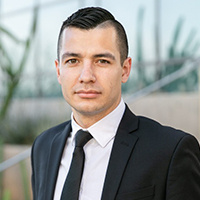Waddell Criminal Lawyer, Arizona
Sponsored Law Firm
-
 x
x

Click For More Info:
-
The Law Office of Joshua A. Lopez
6991 East Camelback Rd. Suite D-300 Scottsdale, AZ 85251» view mapCriminal Defense Law Skilled Criminal Defense Lawyer
A trusted Phoenix criminal lawyer, like The Law Office of Joshua A. Lopez provides dedicated, personalized support and aggressive legal defense to those accused of a crime.
800-964-8710
Zachary Mushkatel
✓ VERIFIEDAccident & Injury, Criminal, Estate, Divorce & Family Law, Litigation
Our Experienced Lawyers Are Here To Assist You With Legal Needs In A Timely, Professional Manner.
Zachary Mushkatel discovered his affinity for the law by chance. As a political science major at the University of Arizona, he first aspired to become... (more)
FREE CONSULTATION
CONTACTWayne Howell
Criminal, Bankruptcy & Debt, Wrongful Death, Accident & Injury
Status: In Good Standing Licensed: 29 Years
Leonard Howard Mandel
Military, Government, Criminal, Business
Status: In Good Standing Licensed: 56 Years
Heather Adrienne Baker-Mushkatel
Divorce & Family Law, Criminal
Status: In Good Standing Licensed: 18 Years
David E Ledyard
Trusts, Criminal, Wrongful Death, Accident & Injury, Estate
Status: In Good Standing Licensed: 45 Years
David E Ledyard
Trusts, Criminal, Wrongful Death, Accident & Injury, Employment
Status: In Good Standing Licensed: 45 Years
Jason R Eastman
Felony, DUI-DWI, Criminal, Accident & Injury
Status: In Good Standing Licensed: 17 Years
Heather Adrienne Baker
Litigation, Divorce & Family Law, Criminal, Personal Injury
Status: In Good Standing Licensed: 18 Years
 Joshua A. Lopez Scottsdale, AZ
Joshua A. Lopez Scottsdale, AZ Practice AreasExpertise
Practice AreasExpertise

